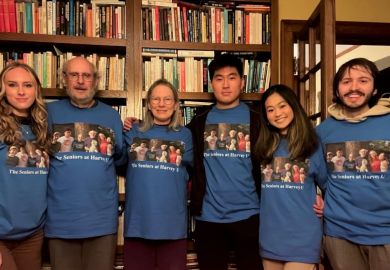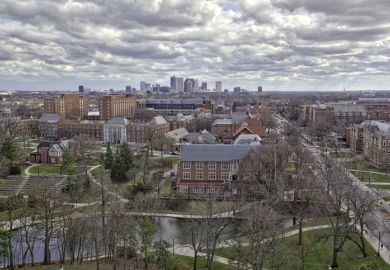As I often say, there was no golden age of higher education. Whatever those who despair of the current state of things might believe, a sense of crisis is a recurring theme of US university history.
Nevertheless, as someone who values the full range of human learning, I consider myself lucky to have been an undergraduate in the 1960s.
I entered a medium-sized selective private university in 1967, completed graduate study at the much larger public University of Toronto and taught across disciplines for 45 years in three public universities in two states, small and very large, new and long-established.
In the 1960s, there was still a semblance of a shared educational experience. General education requirements were common across the campus throughout students’ first years and into part of their second. Rooted in elective choices, the options ranged from history and foreign languages to classroom and lab sciences – and even physical education.
In addition, unlike today, a significant portion of teaching for business and engineering students was provided by the departments of economics and math-stats in the former case and physics, chemistry and math-stats in the latter.
It wasn’t perfect, but the result was that students from across campus shared a significant foundation in college-level learning. We met and had opportunities for interchange and friendship. A history major and sociology minor myself, my best friends and roommates were doing engineering, pre-med and pre-law as well as arts, humanities and journalism majors.
That common core steadily dissipated through the 1980s, 1990s and 2000s, often replaced by varying combinations of credits and exemptions for Advanced Placement courses and so-called “college-level” high-school courses. The latter lack any degree of quality control and are often promoted to lure high-schoolers and their parents toward post-secondary enrolment by fooling them about reducing costs, confusing exemptions from requirements with actual course credit.
Pandemic online and hybrid courses only exacerbated the isolation. My current undergraduate friends and acquaintances – many of them at the extremely large Ohio State University – know few peers outside specific classes, even within their majors. And they regret that. They welcome any opportunities to make new cross-disciplinary connections.
Undergraduates, especially in STEM fields, often tell me that they “miss reading”. Most grew up reading widely at home and in school and public libraries, but those in pre-professional majors rarely read beyond expensive textbooks that are often written and required by course instructors. Accounting students want to learn more economics and communication skills, including writing. Engineering students long for a course in the history, philosophy and literature of science and technology.
Many faculty report that they would gladly teach such courses. But university budget “models” disincentivise generating credits from student enrolments that do not accrue completely to one department.
We must do better. But it seems to me that beyond a small number of traditional liberal arts colleges and some of the component colleges of the mainly vocational public land grant universities, there has been no consensus on either “common good” or “common core” of higher education. Nor do I propose to reconstitute the elective choice distribution or general education requirements I enjoyed in the 1960s: as I said, this was no golden age.
I envision a more focused foundational core of lectures and smaller discussion courses offered across the first two years of undergraduate study, inseparably interrelated with civic, social, cultural and economic lives, present and future. The aim, in part, would be to obtain an understanding of historical origins, defined contexts and developments over time and space. My conception also links, to a novel extent, the classroom and campus life: the so-called curriculum and extra-curriculum.
Specific themes and content would vary by instructor, but, to the extent possible, most if not all courses would combine the arts, humanities, social sciences and STEM. Broad topics would include documented, inclusive US history in comparative perspectives; politics, including civic culture and participation and the US constitution in comparative perspectives; comparative civilisations; interrelationships of the past, present and future across the arts, humanities, social sciences, math/stats; natural sciences, business and technology; and basic knowledge of at least one non-native language.
This core would be “book-ended,” to use a currently popular phrase. That is, there would be relatively small introductory and “exit” courses that aimed at broadly intellectual critical thinking but also academic, extracurricular and vocational connection-making.
The “core faculty” teaching these courses would be well supported, working in collaboration with their primary departments and colleges, as well as the central office of academic affairs. Crucially, the latter must be galvanised to stimulate, coordinate and fairly fund cross-college communications, so that interdisciplinary team teaching is encouraged and supported, not hindered.
The aim is not to duplicate secondary schooling. High-school students might be exposed to a wide range of subjects, but their teachers are often no better at bringing out broad themes that transcend particular disciplines than university faculty are.
The aim is to produce graduates with a broad grasp of the issues that have, do and will affect their societies. Such people are not only more happy and stimulated in themselves, but they also make better workers and more engaged citizens. And that, surely, is the mission of ours and every age.
Harvey J. Graff is Professor Emeritus of English and History at The Ohio State University and inaugural Ohio Eminent Scholar in Literacy Studies. His most recent book is Searching for Literacy (2022).
Register to continue
Why register?
- Registration is free and only takes a moment
- Once registered, you can read 3 articles a month
- Sign up for our newsletter
Subscribe
Or subscribe for unlimited access to:
- Unlimited access to news, views, insights & reviews
- Digital editions
- Digital access to THE’s university and college rankings analysis
Already registered or a current subscriber?








